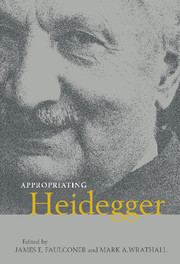Book contents
- Frontmatter
- Contents
- List of contributors
- Acknowledgments
- 1 Appropriating Heidegger
- PART 1 THINKING OUR AGE
- PART 2 HEIDEGGER IN CONTEXT
- PART 3 READING BEING AND TIME
- 9 In respectful contempt: Heidegger, appropriation, facticity
- 10 Could anything be more intelligible than everyday intelligibility? Reinterpreting division I of Being and Time in the light of division II
- 11 Another time
- 12 Intentionality, teleology, and normativity
- Index
11 - Another time
Published online by Cambridge University Press: 22 September 2009
- Frontmatter
- Contents
- List of contributors
- Acknowledgments
- 1 Appropriating Heidegger
- PART 1 THINKING OUR AGE
- PART 2 HEIDEGGER IN CONTEXT
- PART 3 READING BEING AND TIME
- 9 In respectful contempt: Heidegger, appropriation, facticity
- 10 Could anything be more intelligible than everyday intelligibility? Reinterpreting division I of Being and Time in the light of division II
- 11 Another time
- 12 Intentionality, teleology, and normativity
- Index
Summary
What would be required in order to suppose another time? What would be required in order to suppose and even in some measure to establish that there is another time, assuming that one can appropriately say of time that it is or at least that there is time, that there is this time and perhaps another time? What could warrant setting aside the assumption – seldom challenged in the history of philosophy – that time is singular? What could warrant setting aside even the assumption that, if there are multiple times, they are nonetheless in the final account all gathered into a single time, so that in the end the singularity of time would still be preserved? Can one be assured of the efficacy of such a gathering? Can one be assured that the time of a dream, the time of imagining, and the time of madness can all be reclaimed and reintegrated into a single all-encompassing, all-governing, time? Can one be assured also that the times of elemental nature can be gathered and integrated into this single time? Can one be assured that the time of day and the time of year, that is, the times told by the most natural of clocks, the sun, can be brought to coincide, without remainder, with the times of the soul and of history? Or would there perhaps remain outside any such singular time as such, outside any time regarded as constituting time as such, an irrepressible trace of another time?
- Type
- Chapter
- Information
- Appropriating Heidegger , pp. 175 - 190Publisher: Cambridge University PressPrint publication year: 2000
- 1
- Cited by



